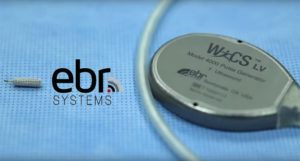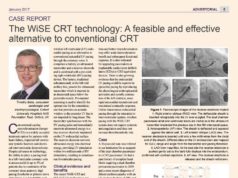 EBR Systems has announced enrollment of the first patients in the global SOLVE-CRT (Stimulation of the Left Ventricular Endocardium for Cardiac Resynchronisation Therapy) clinical trial.
EBR Systems has announced enrollment of the first patients in the global SOLVE-CRT (Stimulation of the Left Ventricular Endocardium for Cardiac Resynchronisation Therapy) clinical trial.
The first patients were enrolled by Christian Butter at Immanuel Klinikum Herzzentrum Brandenburg in Bernau, Germany; Jeffrey Alison at Monash Heart in Clayton, VIC, Australia; John Ip at Sparrow Health System in Lansing, Michigan, U.S.A.; and by Tim Betts at Oxford University Hospitals NHS Foundation Trust, John Radcliffe Hospital, Oxford, U.K.
SOLVE-CRT is a randomised, double blinded, prospective pivotal trial intended to assess safety and efficacy of the WiSE (Wireless Stimulation Endocardially) pacing technology in support of U.S. Food and Drug Administration (FDA) approval. The study will enroll 350 heart failure patients who have failed to respond to, or are otherwise unable to receive, conventional cardiac resynchronisation therapy (CRT). The study will take place at up to 45 U.S., European and Australian investigational sites.
The WiSE CRT System is designed to improve the heart’s pumping ability and help overcome symptoms of heart failure. Rather than using pacing leads — decades‐old technology with well‐documented problems — WiSE paces the heart via a tiny wireless electrode, the size of a grain of rice, implanted directly in the heart’s left ventricle. This approach provides the cardiologist greater choice of pacing locations, enabling patient-specific customisation of pacing site.
Additionally, endocardial (inside the heart) placement of the electrode is believed to be more physiologic than the traditional epicardial (outside the heart) approach. The combination of endocardial pacing and patient-specific electrode positioning may be more effective than today’s systems. The WiSE system works together with a previously implanted pacemaker or implantable cardioverter defibrillator (ICD) that paces the right side of the heart.
“Wireless pacing promises to address an important unmet need for patients with heart failure. Studies have demonstrated successful cardiac resynchronisation therapy improves symptoms and reduces hospitalisations and mortality, but many patients do not respond to traditional CRT devices and have limited therapeutic options,” said Jagmeet P. Singh of Massachusetts General Hospital in Boston, Mass, who serves as the study’s global principal investigator. “I am excited to lead this important trial to hopefully confirm earlier promising results in a larger population and demonstrate WiSE CRT’s potential as a new option for patients who would otherwise face progressive deterioration of their condition and repeated hospitalisations.”
Cardiac resynchronisation therapy offers a proven treatment for heart failure, but as many as 30%of heart failure patients receiving conventional CRT do not respond to the treatment. Without CRT, people with heart failure deteriorate and may eventually die of the condition. For many, medicine only helps to a limited degree.
“We believe SOLVE-CRT to be a landmark study that will build on previous positive results of this first-of-its-kind innovation for heart failure patients,” said Allan Will, chairman and CEO of EBR Systems. “We are thrilled to have the participation and enthusiasm from so many world-class sites, who are motivated to expand the benefits of CRT therapy to patients who currently have no promising therapeutic alternatives.”












